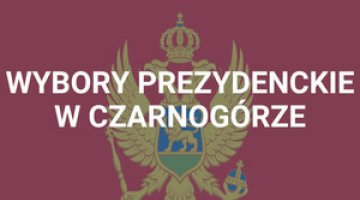Montenegro elections: the Socialists defeated, the changes continue
The Europe Now! Movement, a party co-founded by the new president Jakov Milatović, got 25.6% of the votes and won the snap elections to the 81-seat parliament in Montenegro on 11 June. The Together! electoral bloc came second with 23.2% support. Its main force is the Democratic Party of Socialists (DPS), which was led until April this year by the former president Milo Djukanović. The pro-Serb bloc For the Future of Montenegro, the coalition of Democrats & United Reform Action, the Bosniak Party and the Socialist People’s Party-DEMOS will also enter parliament. In addition, three seats in the new parliament will go to representatives of the Albanian minority and one to the Croatian minority. Turnout was 56%.
Djukanović scheduled the snap parliamentary elections in March this year because for a long time it had been impossible to form a majority government in the parliament elected in 2020. Since April 2022, a cabinet led by Dritan Abazović has governed the country, with the support of some parliamentary groupings (the United Reform Action, the Socialist People’s Party, the Bosniak Party and representatives of the Albanian minority). The cabinet was approved partly thanks to support from the DPS, even though it did not enter the government. The government lost a vote of no confidence last August and was to continue functioning until a new majority cabinet was formed, but it remained in power as a technocratic government.
Commentary
- The Europe Now Movement won the election because the Montenegrin public is disillusioned with Djukanović and the DPS, who have governed the country for over 30 years. This comes as a major success for the young movement, which was formally established last year and has not had any parliamentary representation so far. However, its leaders were part of the political camp which took power in 2020, and its co-founders Milojko Spajić and the incumbent president Milatović served as ministers in 2020–2. Undoubtedly, Milatović’s April victory in the presidential race also contributed to the party’s success (see ‘Presidential elections in Montenegro: the end of the Djukanović era’). The Europe Now Movement has a centrist, pro-European, technocratic and anti-corruption profile, and claims to represent a generational change. Many of its key activists were educated in the West, but also have personal ties to Serbia. The movement advocates maintaining NATO membership and stepping up the accession negotiations with the EU which have been ongoing for 11 years/over a decade. At the same time, it is interested in bringing Montenegro into the Open Balkan initiative, a format initiated by Belgrade in 2019 which includes Serbia, North Macedonia and Albania. Its principles include getting border controls lifted and improving political and economic relations between the participating countries. During the last decade of Djukanović and the DPS’s rule, relations with Serbia deteriorated partly because Montenegro accused Serbia of interfering with its internal affairs.
- The DPS’s defeat fits in with a series of political failures over the past three years. Until the recent election, this party had always won the largest number of parliamentary seats, either independently or in a coalition bloc. It won the 2020 elections but was unable to form a government. Recently, it has also lost power in many local government structures, and in the presidential race this April its candidate Djukanović lost to Milatović by 20 percentage points. This tendency suggests a gradual shrinkage of the traditional electorate of the DPS, even though it is given credit for Montenegro regaining independence. It also proves the waning of the historical disputes between the ‘Montenegrin’ and ‘pro-Serbian’ options which determined national policy for a decade or so after the proclamation of independence. The ‘Montenegrin’ option was associated with the Socialist camp and Djukanović, while the ‘pro-Serbian’ choice was linked to a number of opposition groupings.
- Forming a government coalition will be quite a challenge for the Europe Now! Movement. It has ruled out cooperation with the Socialists and those parties which were running with them in the elections as the Together bloc. It will thus have to look for coalition partners in other parliamentary blocs, above all with For the Future of Montenegro and the Democrats & United Reform Action. However, these blocs are made up of many groups with different political agendas, and their main motivator for cooperation so far has been making joint efforts to criticise the rule of President Djukanović and the DPS. Politicians from both these blocs supported Milatović in the second round of the presidential election solely to remove Djukanović from power. So far, mutual dislike has dominated the relations between Europe Now and Prime Minister Abazović, who represents the Democrats & United Reform Action bloc. Therefore, negotiations on forming a new government may take some time.
Chart. Distribution of the parliamentary seats after the 11 June elections in Montenegro

Source: Centar za monitoring i istraživanje CeMI, cemi.org.me.



